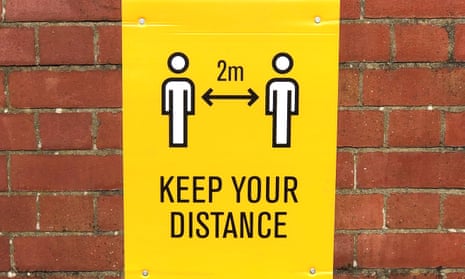More than 2 million people in England on the government’s shielding list, considered vulnerable to Covid because of their health, will be advised to take precautions and follow social distancing as cases surge, but most will not be told to stay home, the Department of Health and Social Care has said.
The announcement was strongly condemned by patients groups, who argued that the government was doing too little to support those at most risk. Blood Cancer UK called the advice “ludicrous”, while Kidney Care UK said they were being asked to choose between their livelihoods and their health.
As the numbers of cases, hospital admissions and deaths rise, those on the former shielding list have been anxious to know whether they should stay in their homes as they did in the spring. The “clinically extremely vulnerable” group includes people with conditions affecting the immune system, certain cancers and organ transplant recipients.
The government says that, for most people, shielding is not necessary this time, except potentially in tier 3 – the areas with the highest rates of infection. Some of those people may be advised by the NHS to stay at home, not go to work or school and limit social interactions to their own household and support bubble. But, says the department, that will not automatically apply to every area or every vulnerable individual in tier 3. Those affected will be notified by letter.
People with vulnerabilities will generally be advised to take more precautions than other people in their area – for instance, by meeting people from other households outdoors rather than indoors where either is allowed. But they can continue in their jobs if their workplace is “Covid-secure”.
“Over the last few weeks, we’ve seen a sharp increase in the prevalence of the virus across the country and we know those who are clinically extremely vulnerable are looking for practical advice on how they can carry on their lives while the virus remains in our communities,” said Dr Jenny Harries, the deputy chief medical officer for England.
“The new system will provide clarity on how best those in this group can keep themselves as safe as possible depending on the rates of transmission in their local area. Whilst advisory, I would urge all those affected to follow the guidance wherever they can and to continue to access health services for their medical conditions.
“We will continue to monitor the evidence closely and fine-tune this approach to make sure everyone in this group is clear about the safest way to go about their daily lives, particularly over the coming winter months.”
But patient groups representing some of the most vulnerable were angry. “It is completely unacceptable that even in areas where the alert level is very high, the government expects people with blood cancer who cannot work from home to carry on travelling into work,” said Gemma Peters, the chief executive of Blood Cancer UK.
“It is a ludicrous situation where the government guidance is telling people with blood cancer to stay away from shops because they’re too dangerous, and in the same breath that it is fine for them to spend many hours in shops if they happen to work in them. In the same areas people with blood cancer are being told to avoid all but essential travel, the government is saying it is fine for them to continue working in busy places like cafes, restaurants and schools.
“Even if the infection rate became so high that shielding was reintroduced, all the government is offering people with blood cancer is that they may be entitled to statutory sick pay. Statutory sick pay is nowhere near enough to support a family, and so even in these areas we would be likely to see people with blood cancer forced to choose between their health and finances.”
Fiona Loud of Kidney Care UK, said: “The latest guidance for those in the clinically extremely vulnerable group gives no guarantee of financial support, even in the areas of highest risk. The government is now leaving vulnerable people forced to choose between protecting their homes and livelihoods, and protecting their own health. This will have a huge impact on their physical and mental wellbeing at a time when services are extremely stretched and have by no means caught up with demand.”
Shielding ended in August for most people, although some continued to shield into October. The government says it is no longer necessary for the majority of people to shut themselves away as they are protected by social distancing, mask-wearing and local restrictions such as the rule of six. Shielding in the spring left some highly vulnerable people feeling lonely and fearful in their homes, it says.
The health secretary, Matt Hancock, said the government was doing what was needed to protect the most vulnerable.
“With coronavirus rates continuing to increase, now is the time to take action and ensure we protect the most vulnerable in our society,” he said.
“Today’s announcement will mean every person most at risk from serious outcomes from the virus will have specific advice targeted to local levels, which they can follow to keep themselves as safe as possible, while ensuring they can also keep as much normality in their lives as possible.”
